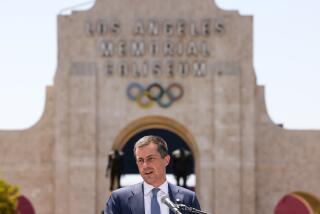MTA Considers Raising Price of Monthly Passes
- Share via
County transportation officials are considering raising the cost of monthly bus, subway and light-rail passes while lowering the daily fee for one-way tickets, which would be the system’s first fare overhaul in eight years.
“We’re looking at ways to generate more revenue for the bus system, and the fare system is an obvious place to start,” said Metropolitan Transportation Authority Chief Executive Roger Snoble, whose agency is facing a projected $1.4-billion shortfall in 10 years.
Final details of the fare overhaul are not expected to be made public until a proposal is made to the MTA board, probably next month. But a rough outline is emerging.
Under the plan, which could take effect as soon as this fall, the MTA would increase the cost of monthly and two-week unlimited-ride passes. The monthly passes currently cost $12 for seniors and $42 for most other users. The cost of a one-way cash fare for buses and trains, currently $1.35, probably would be lowered by an unspecified amount.
Also being reviewed are one-way bus tokens, which cost 90 cents and come in packs of 10.
Spokesman Marc Littman said the MTA charges far less than other large transit agencies for monthly passes, which the agency believes are too heavily subsidized. Though roughly 40% of riders use them, the passes account for just 30% of revenue from fares.
The revenue shortfall occurs because the average pass holder makes 109 trips per month, according to the MTA. “It takes just 31 trips for a monthly pass holder to break even,” Littman said. “After that, it’s all on us.”
Snoble said the agency must pay for improvements in bus service required in a federal consent decree, an agreement signed by the MTA in 1996. “Frankly, this would probably not be necessary, if not for the consent decree,” Snoble said.
The decree was signed to avoid a class-action lawsuit organized by the Bus Riders Union, an advocacy group that charged that the bus system was in such disrepair that it violated the civil rights of poor people in minority groups, who are the bulk of the MTA’s riders.
The consent decree calls for the MTA to reduce bus overcrowding. With the MTA and the Bus Riders Union still disagreeing about how to do that, a court-appointed mediator may soon order the MTA to add scores of new buses.
Each MTA bus costs $352,000 per year to run, according to the agency.
Under terms of the consent decree, the MTA is allowed to alter its fare structure, though the agency has chosen not to do so until now.
Still, Bus Riders Union representatives have criticized any plan to raise fares. They argue that the MTA has not done nearly enough to expand its fleet and that raising the price of monthly passes would be a blow to the roughly 1.1 million riders who take MTA buses daily.
“Bus riders can’t afford it,” Barbara Lott-Holland, the organization’s co-chairwoman, who suggested the MTA instead lower fares to 50 cents and cut the cost of passes.
“I would like to see them ride on the bus and explain to bus riders why they are raising fares,” Lott-Holland said.
MTA officials say that restructuring fares will help pay for better service, while putting the agency’s costs more in line with transit elsewhere in the U.S.
The average subsidy per MTA passenger was $1.29 in 2000, according to an MTA study of a federal database of transit agencies.
The study showed that the average passenger subsidy on transit systems in Chicago, New York, Washington and Philadelphia was 88 cents.
The MTA is also planning widespread changes in its bus routes by June.
It is considering adding service to some heavily used areas and cutting back on infrequently used routes, particularly routes that duplicate service provided by smaller transit firms, such as Long Beach Transit.
The riders union says no service should be trimmed.
More to Read
Sign up for Essential California
The most important California stories and recommendations in your inbox every morning.
You may occasionally receive promotional content from the Los Angeles Times.











